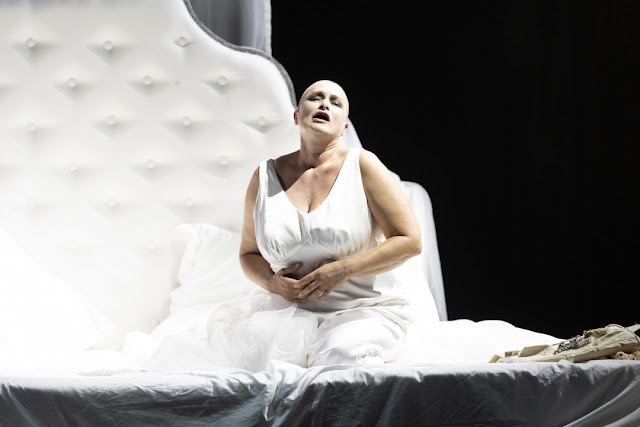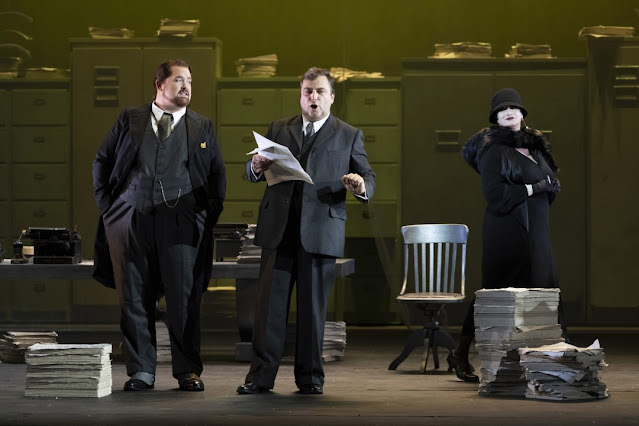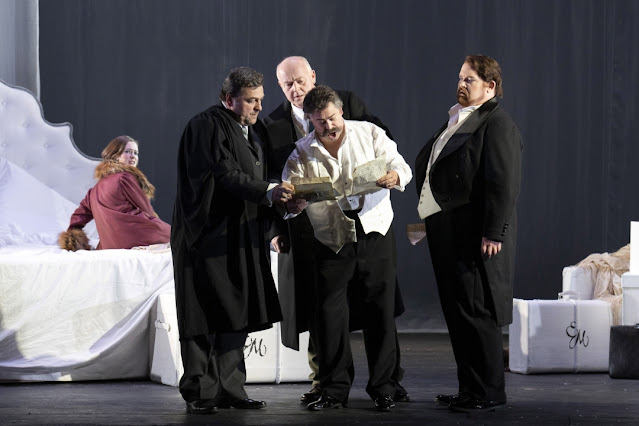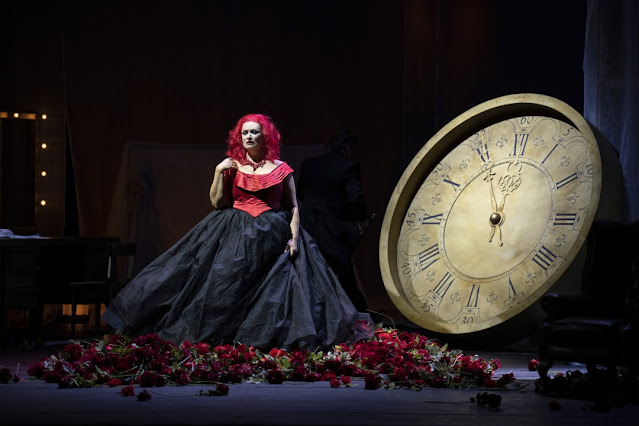 |
| Janacek: The Makropulos Affair - Angeles Blancas Gulin in Act Three - Welsh National Opera (Photo Richard Hubert Smith) |
Janacek: The Makropulos Affair; Angeles Blancas Gulin, Nicky Spence, Gustav Belacek, Mark Le Brocq, Harriet Eyley, David Stout, Alexander Sprague, Alan Oke, director: Olivia Fuchs, conductor: Tomáš Hanus; Welsh National Opera at the Mayflower Theatre, Southampton
Reviewed 25 November 2022 (★★★★½)
A mesmerising performance in the title role is at the centre of this richly detailed and wonderfully musical account of one of Janacek's most fascinating works
In some ways Janacek's The Makropulos Affair is the operatic equivalent to bleak house, both works examine the fall out from a long running court case, but in the case of the opera it has a meditation on eternal life mixed in. Janacek based his opera The Makropulos Affair on Karel Čapek's 1922 play of the same name, a thought experiment about a woman who was 300 years old and was constantly reinventing herself. But when Janacek saw the play it was Emilia Marty the woman who fascinated him, what would it mean to be 300 years old. In her introductory article for the programme for Welsh National Opera's new production of Janacek's opera, director Olivia Fuchs comments about Čapek's play resonating with Janacek's view of the cyclical nature of life and death,
I finally caught up with Fuchs' new production of The Makropulos Affair at the Mayflower Theatre in Southampton (built as The Empire Theatre just five years after the opera premiered) at the final performance of the run on 25 November 2022. Angeles Blancas Gulin was Emilia Marty with Nicky Spence as Albert Gregor, Gustav Belacek as Dr Kolenaty, Mark Le Brocq as Vitek, Harriet Eyley as Krista, David Stout as Baron Prus, Alexander Sprague as Janek and Alan Oke as Count Hauk-Sendorf. The conductor was Tomáš Hanus, designs were by Nicola Turner.
 |
| Janacek: The Makropulos Affair - Nicky Spence, Gustav Belacek, Angeles Blancas Gulin in Act One - Welsh National Opera (Photo Richard Hubert Smith |
Though the setting was firmly period, there was an element of freedom to Nicola Turner's designs, an element of the surreal, particularly in the second act. And for each scene, there was a sense of over the top accumulation, mirroring the way Emilia Marty's life had gone on too long and got too much stuff in it. So, the solicitor's office in Act One was all papers and filing cabinets, the theatre in Act Two featured a huge mound of red roses from bouquets given to the singer, and in the final act Emilia Marty's luggage strewn all over the hotel bedroom. And a clock was also a big feature of the designs, the different layers of time are important in this opera.
Fuchs gave us a series of strongly wrought characters, making each one count in a different way. The legal case can be a bit of a dramatic problem, the work can get rather mired in it, but here the playing was vivid and well differentiated, Then in the scene change pause between acts one and two (done behind a cause curtain so that for once we actually saw the scene change happening), Mark le Brocq appeared in front of the curtain and, stepping out of character, neatly and amusingly explained the background to the legal case.
Angeles Blancas Gulin was a terrific Emilia Marty. Wearing Nicola Turner's stylish costumes, in Act One Blancas Gulin fascinated and intrigued, successfully conveying the way Emilia Marty was at the same time rather distant yet always the object of attention. As Act Two progressed we gradually saw both how monstrous this woman had become, how uncaring of the trivial detail of the world and also how riven by existential despair. Blancas Gulin brought out the monster but also gave us sympathy with her too. Then in act three, she gives everything up and stops struggling and finally reached peace. Throughout Blancas Gulin exercised fascination, and her command of the highly detailed emotional trajectory was superb. In the final act she seemed to age before our eyes, mesmeric to the end.
 |
| Janacek: The Makropulos Affair - Harriet Eyley in Act Two - Welsh National Opera (Photo Richard Hubert Smith |
Surrounding her was the group of sad men who are desperate to win her attention, yet are doomed to be disappointed. There are no heroes in this opera, all end up sadder yet wiser.
Nicky Spence made a subdued yet fascinatingly drawn Albert Gregor, a dapper man of the world complete with spats, there was a desperation underneath. He had little Emilia Marty wants, and not even his being her descendant can save him. By contrast David Stout's Baron Prus has exactly what she wants, the document detailing the formula for the elixir that will preserve Marty's life. But when Prus gets what he wants, he finds it is disappointing. Stout and Blancas Gulin's coupling at the beginning of Act Three had a 'Carry On' feel to it with Prus' middle aged bottom revealed in action, yet as with any comedy it was sad too, and Stout was brilliant at depicting this pillar of the establishment's downfall.
Neither of the lawyers was completely immune. Both Gustav Belacek's Kolenaty and Mark Le Brocq's Vitek were strongly drawn, making them far from dry, and both were dazzled in their way, letting Emilia Marty manipulate the case in way that was foreign to their disciplined nature.
 |
| Janacek: The Makropulos Affair - Harriet Eyley, Gustav Belacek, Mark Le Brocq, David Stout, Nicky Spence in Act Three - Welsh National Opera (Photo Richard Hubert Smith) |
Prus' son Janek is the tragic centre of the opera, desperately in love with Krista at first, one glance at Emilia Marty and he is infatuated, and despairs when seeing his father behaving similarly. But to Emilia Marty he is just another, 'they all die'. Alexander Sprague was a touching Janek, eager and puppyish. As his girlfriend Krista, Harriet Eyley was poised. Krista is not immune, but Emilia Marty has made her despair of being a sing. Eyley made Krista's journey quite believable, and she is the one at the end who realises the fatality of the formula and burns it.
Alan Oke's Hauk-Sendorf seemed to be the only character to accept Emilia Marty for what she was. Technically mad, Oke made Hauk-Sendorf's scenes with Blancas Gulin a refreshing tonic in the complex mix of this drama.
Julia Daramy-Williams, Dafydd Allen and Monika Sawa provided strong support as the chambermaid, stage technician, doctor and cleaning lady.
In the pit Tomáš Hanus and the Welsh National Opera orchestra's performance was little short of thrilling. Janacek's music is terrific, and in this opera seems to almost break the bounds of convention. Hanus and the orchestra revelled in the opportunities, with brass players dotted around the theatre. Yet the orchestra remained part of the drama, a vivid counterpoint to the stage action.
 |
| Janacek: The Makropulos Affair - Angeles Blancas Gulin in Act Two - Welsh National Opera (Photo Richard Hubert Smith |
The Makropulos Affair does not crop up in opera houses all that often, but when it does it can be rather special experience (I still have vivid memories of Elisabeth Soderstrom in the role at WNO and Anya Silja at Glyndebourne). This was one of those occasions. Whilst Olivia Fuchs and Angeles Blancas Gulin created a many-sided heroine, the strength of this production lay in the way that Blancas Gulin's mesmerising performance was embedded in an wonderfully multi-layered and detailed ensemble, full of strongly etched characters and fine performances.
Never miss out on future posts by following us
The blog is free, but I'd be delighted if you were to show your appreciation by buying me a coffee.
Elsewhere on this blog
- Finding its true form: Ian Venables' new orchestral version of his Requiem in fine a performance from the choir of Merton College on Delphian - record review
- Celebrating St Cecilia's Day in style: Freiburg Baroque Orchestra in Purcell and Handel at Wigmore Hall - concert review
- Changing Standards: London Sinfonietta at the EFG London Jazz Festival - concert review
- Music for French Kings: Amanda Babington introduces us to the fascinating sound-world of the musette in French Baroque music - cd review
- 2117/Hedd Wyn: Stephen McNeff & Gruff Rhys' Welsh language opera celebrating the Welsh poet - record review
- The sad clown and the ingenue: Jo Davies' 1950s-set production of The Yeomen of the Guard from English National Opera - opera review
- Young artists from Britten Pears Arts and Royal Opera impress in Britten's The Rape of Lucretia -opera review
- What it means to perform Turangalila: pianist William Bracken shares his thoughts on Messiaen's Turangalila Symphonie in advance of performing it- feature
- Massive climaxes & mystical moments: Vaughan Williams' A Sea Symphony is the centrepiece of The Bach Choir's celebration at the Royal Festival Hall - concert review
- Unnervingly different: Icelandic experimental composer Guðmundur Steinn Gunnarsson's Landvættirnar fjórar - record review
- English music with a French accent: Ensemble Correspondances and Sébastien Daucé in Matthew Locke's Psyche - record review
- The friendship of Hector Berlioz and Théophile Gautier in song at the London Song Festival - concert review
- Home











No comments:
Post a Comment